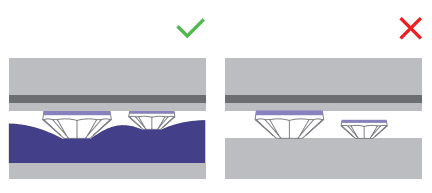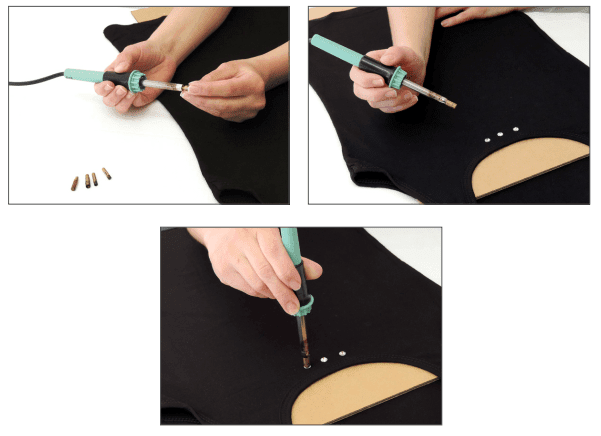Iron-on stones are popular findings for embellishing or decorating various materials, most often fabrics. You can adjust your favorite t-shirt, dress or bag to your image.
The basic principle of iron-on stones is that on the lower, flat side there's a layer of glue, which melts with heat, the glue connects with the material to which the stone is applied and holds on it after cooling. Textile materials with stones glued on using the hotfix method, i.e. using heat, can be washed at a maximum of 60 °C, dried in a tumble dryer and carefully also chemically cleaned and ironed.
Proper gluing can only be achieved if the glue can "soak" into the material onto which the stone is glued. You can test its suitability with water, for example - if it soaks in, the material is suitable for application. If not, then it would be better to choose another one.

Therefore, unsuitable materials include, for example, smooth or polished leather and imitations thereof, hydrophobic materials, materials dyed with metallic pigments or impregnated fabrics and the like. For some fabrics, it's possible to improve the absorption of the adhesive by washing them before application (for example in the case of previous use of impregnation).
The material onto which the stones will be applied must be heat resistant and should withstand a temperature of at least 120 °C, but the required temperature varies depending on other aspects and is usually higher.
Last but not least, care must be taken to ensure that the material is resistant to pressure (even for several tens of seconds). Some materials (such as synthetic fibers) can get damaged by prolonged exposure to bigger heat whilst under pressure. Therefore, if the material begins to deform under pressure (for example, as in the third figure), it will be necessary to select another material.

The principle of the hotfix method is that by applying heat and pressure we melt the glue, which soaks into the fabric. After application, it takes about 5 minutes for the adhesive to cool and then it's necessary to wait 24 hours for the glue to 100% adhere to the material. Until then, it is not advisable to wash, clean or iron the fabric. Depending on the chosen procedure, we will deal with a more specific description of the application below.

In any case, make sure that the fabric is stretched before you start the application. Crumpled or unevenly distributed material could cause the stone to not adhere well. If you're going to decorate an elastic material, the fabric should be slightly stretched for the best results.

The temperature required for the correct application of the stone depends, first of all, on the temperature resistance of the material (fabric) and the size of the selected stone. It should be at least 120 °C and can reach up to 200 °C.

The application pressure depends on the size of the stone, the base material and the technical equipment (heat source) and the chosen method of application.
The pressure exerted on the stone or stones should be uniform in the first place.
The pressure should be such that the glue can soak into the fabric evenly under the stone, but it should not be too intense so that the glue does not "leak" around the bottom of the stone.

Beware of applications near buttons or zippers - they can cause the pressure on the stone to be uneven and it will not stick properly. The same applies to the application of stones of different sizes, where it's recommended to use a compensating pad (such as silicone one), which compensates for the different size of the stones.

The most common method of gluing is "from above", when we apply pressure and heat to the upper, faceted part of the stone and the heat thus reaches the glue through the glass. This is great for thinner fabrics. In the case of coarser material or fabric composed of several layers, however, we can choose to heat from below. In the case of using a heat press, both can be combined.

Beware of a few specific stones that can only be applied by bottom heating (for example, Fancy Stones).

The application time depends not only on how big the stone is and what temperature it needs, but also on whether it's being glued from below or from above. Use the tables below to estimate how long the application will take. If you apply smaller stones, then the time required will be slightly shorter, and conversely, if you apply larger stones, you need to add some extra time. The data in the table relate to the application of SS10 stone - Preciosa® MC chaton rose MAXIMA.


The correct application is best recognized when using thin materials, where the adhesive on the back should visibly permeate the fabric. In the case of coarser materials, we can use a magnifying glass to see a thin layer of unabsorbed glue around the stone. This layer of glue is not visible to the naked eye and doesn't interfere with the final product, but it’s an important feedback for the correct application of the stone.
Applying the hotfix by the applicator is very simple. Manufacturer's instructions must be followed regarding the temperature. The application time again depends on the selected stone and material and in this case also on our experience with the given combination.
These hotfix applicators come with several attachments that match specific stones. Don't forget to choose a suitable attachment here. You must also use a suitable heat and pressure pad.
Method:

If you want to apply the stones with an iron, it's advisable to use an iron without steam holes. Steam holes and water escaping from them can adversely affect the adhesion of the stone to the material.

Application with an iron isn't always ideal, other methods of application are the preferred option. The iron can cause unevenness also because the pressure is quite subjective and the ironing surface has an uneven shape. Of course, with a little practice, you can also use an iron.
As with regular ironing, you must use a suitable heat- and pressure-resistant pad when applying the stones. The stones should be ironed over teflon foil or baking paper (with teflon) to protect the iron from glue splashes.
Didn’t the stone stick or does it hold poorly on the seams and multilayer materials?
Is the glue all around the stone?
Heat press has two flat plates for professional heat application. You can heat up either one or both plates.
If you use Heat Press, it must first be preheated and again, we recommend that you try applying it to a small piece of fabric first. The heating process should take at least 3 times longer than the application itself in order to heat the entire application plate evenly.

In the case of a heat press, it's important that the same pressure is applied to all applied stones. The material must also not move. It's possible to use paper adhesive tape to fasten the stones to the heat press.
More information on heat press or ultrasonic applicator application can be found in the official Preciosa manual oficiálním manuálu Preciosa® Components.
Transfer foil is a transparent foil with one adhesive side that's used to easily transfer patterns from stones to material. It's reusable as long as the glue is sticky.
For application, place the stones in the desired design with their upper parts without glue on the foil, the stones will stick to it. When the stones hold, apply the foil to the material and check that the result is as expected. If so, apply a heat press or iron.
After the heat application, we recommend pressing the stones once more with a cotton cloth on individual places to achieve the best possible application.
Don't remove the foil until the glue has completely cooled down to avoid damaging the design. If a single stone doesn’t stick in place, it can then be added separately, for example using a hotfix applicator.
Always use teflon foil or baking paper (with teflon) between the heat source and the transfer foil to prevent damage to the transfer foil, which is made of PVC, caused by excessively high pressure.
The source of information is the official Preciosa® Components manual, the complete text of which you can read here.
